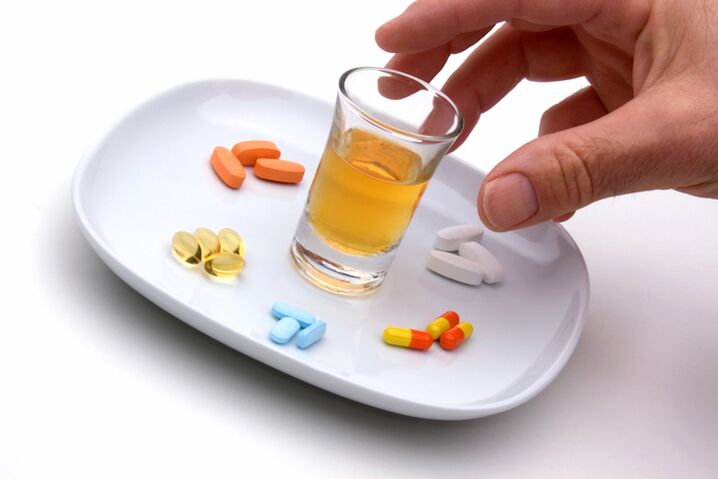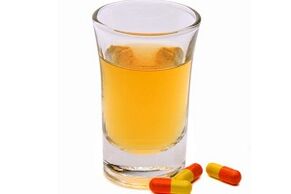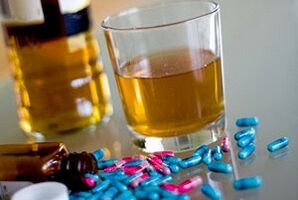Antibiotics, despite the long list of contraindications and a wide range of side effects, are a much-needed drug that has saved more than one life. Because only antibiotics can destroy bacteria in the body that cause dangerous diseases.

In the days before these drugs were invented, many people died from bacterial infections. Many diseases were considered incurable due to the lack of such drugs.
Antibiotics cannot be taken without a prescription and it is very important to follow the rules for taking them. Also, you should know that antibiotics are incompatible with alcohol. This article includes answers to all questions related to taking antibiotics.
Antibiotic rules
The most important rule for taking antibiotics is to use them only in cases where it is impossible to do without them. Indications for use are the symptoms of an acute bacterial infection, which the body cannot cope with on its own. To obtain the desired therapeutic effect, taking antibiotics cannot be indiscriminate.
It is imperative that you follow the instructions below:
- You cannot prescribe an antibiotic on your own if there is no medical education. Only a doctor will be able to determine the cause of the disease: a virus or a bacteria. With a viral infection, antibiotics do not help, on the contrary, they can aggravate the course of the disease;
- You cannot interrupt the prescribed course of treatment if you feel better. A relapse of the disease may occur;
- Do not change the dose of the antibiotic during treatment. A decrease in the dose threatens that the bacteria develop resistance to the drug and an increase is fraught with side effects or overdose;
- You cannot drink the antibiotic with tea, juice and especially milk, otherwise taking the drug will be useless. Milk, dairy and fermented milk products are incompatible with antibiotics, reduce the effect of the drug. You can drink the drug only with water, about 0. 5-1 glass;
- You cannot take antibiotics at any convenient time. It is important to follow the instructions on the medicine and use it as described, that is: before, during or after a meal. In addition, it is important to observe the frequency of administration (1 time in 24 hours, 2 times in 12 hours, 3 times in 8 hours, etc. ), to create the desired concentration of antibiotic in the body;
- Do not combine taking antibiotics with physical activity;
- You cannot drink alcohol during the entire course of taking antibiotics.

Before prescribing an antibiotic, it is imperative to inform the doctor about the following:
- medications that are currently being taken;
- pregnancy or lactation;
- kidney or liver disease;
- diabetes.
And also if it is observed before:
- the appearance of side effects;
- the development of allergic reactions;
- recent use of antimicrobial agents.
When can I drink alcohol after completing the course of antibiotics?
Different antibiotics have different active ingredients. And consequently, each drug has its own terms of elimination from the body. In one case, this is a short period, and alcohol can be taken the next day, and in the other, abstinence from alcohol is required for 7 days.
The necessary information, as a rule, is indicated by the manufacturer in the annotation to the preparation. If you are absent, it is preferable to wait 10 days. Also, if the patient has kidney or liver problems, this period should at least double.
How long after alcohol can antibiotics be taken?
Alcohol is completely eliminated from the body 21 hours after the last intake. After this period, you can take the prescribed antibiotics. However, in any case, it is better to reduce alcohol consumption as much as possible if you are taking a course.
Reasons for the incompatibility of alcohol and antibiotics.
In addition to the fact that taking antibiotics significantly overloads the kidneys and liver, and taking them together with alcohol only aggravates the situation, because ethanol slows down the work of the excretory systems, there is another important reason for incompatibility.
All substances that enter the human body begin to disintegrate until only the original parts remain. This also happens with alcohol and antibiotics. The danger of co-administration is that the antibiotic molecules are similar to the alcohol molecules. The body cannot recognize it correctly, which leads to failure.
Alcohol is perceived by the body as a drug, leading to the fact that the body incorrectly processes alcohol molecules.
Consequences of not complying with the rules of taking antibiotics.
In case of violation of the rules for taking antibiotics, as well as with the wrong choice of a drug or an incorrectly prescribed treatment regimen, unwanted side effects often occur.
These include:
- DysbacteriosisIt is caused by an imbalance between the healthy and pathogenic microflora of the body, which occurs at the moment when pathogenic bacteria begin to quantitatively outnumber the bacteria that perform the protective functions of the body. Dysbacteriosis manifests as candidiasis or repeated diarrhea.
- Allergic reactions. Individual intolerance to the components of the drug plays an important role here. Allergic reactions are different, including irreversible ones.
- Antibiotic resistance of bacteria. Pathogenic microorganisms are able to adapt to the active substance of the antibiotic, you just have to loosen the "grip". They continue their reproduction and the disease continues accordingly.
Only a serious attitude towards taking antibiotics will give the required therapeutic effect.
What antibiotics are strictly forbidden to take with alcoholic beverages?
There are antibiotics that are strictly prohibited to be consumed at the same time as drinks that contain alcohol. This information, without fail, is indicated in the annotation to the medicine, in addition, the doctor who is in charge of prescribing the antibiotic must warn the patient about this.
These medications include the following antibiotics:
- Group of tetracyclines. Preparations based on them are often used in medicine, they have a wide spectrum of action;
- Chloramphenicol group. This group of drugs often causes side effects and, in combination with alcohol, can increase the toxic effect of the drug;
- Group of lincosamides. When taken simultaneously with alcohol-containing beverages, it has a negative effect on the liver and central nervous system;
- Group of aminoglycosides. This group of drugs is one of the strongest among antibiotics. Poor compatibility with other medications, not to mention alcohol.
- The group of cephalosporins. Joint intake with alcohol provokes symptoms of severe intoxication of the body, which leads to a sharp deterioration in well-being;
- Macrolide group. The combination of alcohol and an antibiotic produces a strong toxic effect on the liver and brain;
- Antibiotics used to treat tuberculosis;
- Antibiotics used to treat leprosy.

Also on the drug market there are drugs for which the annotation does not contain information on the interaction with alcohol.
The lack of information about the combination with alcohol does not at all mean that the combination is permissible. It is not necessary to expose the body to unnecessary risks.
Possible consequences of combining an antibiotic and alcohol
There is no way of knowing in advance how a particular organism will react to the simultaneous intake of liquids containing alcohol and antibiotics. Damage can be done to any area of the body.
However, there are the most common consequences:
- Severe allergic reactions;
- Severe and unbearable headache;
- Dizziness;
- Labored breathing
- Chest pain, oppressive character;
- A sudden increase or decrease in blood pressure;
- Cloudy of mind;
- Excessive sweating;
- Nausea or vomiting;
- Hepatic injury;
- Aggravated states of intoxication and hangover;
- The need to repeat the course of antibiotics. Alcohol will reduce or destroy the effect of the drug.
The consequences can be even sadder, it all depends on the individual and his health. The negative consequences are always the suffering of the organism, totally or partially. The negative effects can be easily avoided simply by eliminating the alcohol along with the antibiotics.
It is important to know that currently, through clinical studies, only a part of all antibiotics have been shown to be incompatible with alcohol. The rest of the drugs remain in doubt or are not fully understood.
A person himself must understand the appearance of possible consequences, focusing on already studied incompatible drugs with ethanol. Responsibility for your health should be a priority over any life circumstance associated with drinking.
And to get the best result from treatment, it is necessary to give up alcohol, any, even the weakest.
























